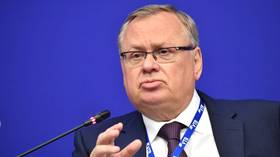
Sanctions preclude Moscow and Beijing from using the US currency in transactions, so turning to national alternatives is only natural, Nelson Wong says

© Getty Images / Image Source
Abandoning the US dollar in Russian-Chinese trade and switching to national currencies is a necessary measure in the current circumstances, Nelson Wong, the head of the Shanghai Centre for RimPac Strategic and International Studies, told RT on the sidelines of the Valdai Discussion Club meeting in Sochi on Thursday.
According to the analyst, de-dollarization was not a choice made by the two countries, but rather a necessity forced upon them by Ukraine-related Western sanctions against Moscow. These restrictions included disconnecting Russia from the SWIFT interbank messaging system, which greatly limited Russia’s ability to conduct international transactions.
“Because of sanctions that are being imposed on Russia – Russia [which is now] out of the SWIFT system – right now trade between China and Russia cannot be settled through this system. So we are forced to look for alternative measures. Settlements in local currency, either in renminbi or rubles, is basically a must,” Wong stated.
He claimed that the two countries are “natural partners” because their economies are “quite complimentary” to each other – China relies on Russia for the supply of gas and minerals, at the same time being able to provide products that are in demand in Russia. However, he stressed that more importantly, the goals of both countries are aligned, with both moving towards a multipolar world in which the US will no longer be able to pull the strings using its currency.
“Our political leadership… has a good understanding of each other and they share common views towards the future of the world, which everybody hopes is going to be fairer, more respecting of every country’s interest instead of having one country calling the shots or telling everybody how to behave… This is what the call for multipolarity is all about – it is not about who is going to be the power, it’s about how every country’s interest, big or small, is respected,” Wong said.
However, he noted that there is still much work to be done to create a new decentralized global trade system, despite the progress that has been made.

“How this settlement method is going to be implemented in people’s everyday life or everyday business activities, that is something both countries, [their] financial systems and businesses, will have to experience and hopefully contribute to the building of a new trade system where the dollar is not going to be the only currency,” Wong concluded.
Georgy Zinoviev, the director of the Russian Foreign Ministry’s First Asian Department, claimed last month that the de-dollarization of Russia-China trade is largely complete. The official said the share of rubles and yuan in mutual settlements between the neighboring nations currently exceeds 80%, while at the beginning of 2022 it was hovering around 25%.
According to calculations from the Russian Economic Development Ministry, published earlier this month, the combined share of the ruble and currencies of so-called ‘friendly’ countries, including the Chinese yuan, in Russia’s foreign trade had reached 72% in exports (up from 15% in early 2022) and 69% in imports (up from 33% in early 2022) by mid-2023.
For more stories on economy & finance visit RT’s business section



